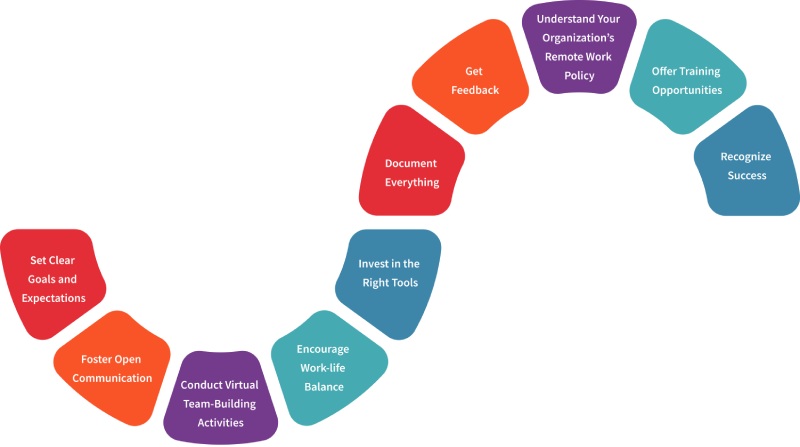Managing a remote
team can be both exciting
and challenging. With everyone
working from different places, it’s
easy for things to get lost in
translation or for team members to
feel disconnected.
But don’t
worry!
Whether you’re new to
managing remote workers or just
looking to improve, there are simple
steps you can take to help your team
thrive.
In this blog, we’ll
explore 10 best practices that will
keep your remote team connected,
productive, and happy. Let’s dive
in!
Best Practices to Manage Remote Teams

1. Set Clear Goals and Expectations
Setting clear goals is an essential
step for every new beginning. Set
clear goals for your remote
team so they know their
roles and what they need to do. When
team members understand what is
expected from them, it really helps!
A great way to do this is by
using the SMART method. SMART means
goals should be Specific,
Measurable, Achievable, Relevant,
and Time-bound. This helps you
create clear goals that your remote
team can agree on. Also, when you
have clear goals and deadlines, it
encourages team members to take
charge of their work.
Remember
to discuss these goals in your
meetings! Checking in on them
regularly keeps everyone focused and
on track, which helps reduce
confusion and improve
productivity. When everyone
knows what they need to do, great
things can happen!
2. Foster Open Communication
Open
communication is the
backbone of effective remote team
management. It helps build trust and
makes sure everyone understands what
is going on, even when they are in
different places. Encourage team
members to use communication
channels, like chat apps, video
calls, and email. Each method is
useful, and using them together
helps everyone feel connected and
informed.
For example, chat
apps are good for asking quick
questions and having friendly
talks. Video calls make
meetings feel more personal and
connected. Email is useful for
sharing important
news or sending documents.
By using these tools well, you can
help everyone share information
easily in the team.
3. Conduct Virtual Team-Building Activities
Your team often feels bored and
isolated, which has a big impact on
them. It is better to conduct virtual
team-building activities to
help them feel engaged and
motivated.
There are multiple
ways to keep your remote team
engaged with virtual activities. You
can start by setting up online games
like trivia, pictionary, or escape
room challenges. These activities
are fun and help the team think
creatively and solve problems
together.
Another option is to
schedule virtual coffee breaks or
casual chats, where team members can
interact casually, similar to how
they would in the office. You can
also conduct team-building workshops
that teach useful skills like
communication, leadership, or time
management.
Another
good option is to conduct virtual
team challenges, where employees
work together to solve a problem or
complete a task. This could be a
puzzle, a design project, or even a
fitness competition. These
activities not only break the
monotony of the work but also help
to build trust and reduce
communication barriers.
4. Encourage Work-life Balance
Don’t ever put your team under stress
just because they are working
remotely. It is important to
help employees balance
their work and personal
lives, especially when working
from home. Because, while
working remotely, there will be
blurred lines between personal and
work life. Remind your team to work
only during work hours and take
breaks to relax.
Tell them not
to contact colleagues related to
work issues after working hours.
Help them keep work and personal
life separate to avoid getting too
tired and stressed. It is better to
implement a fixed break company-wide
where everyone takes a break
simultaneously. Also, try to conduct
programs on fitness, mental health,
etc. which helps them to stay
healthy and motivated.
5. Invest in the Right Tools
To manage your remote teams better, it is necessary to use the best remote employee management tools. Tools like Slack or Zoom help with communication, while Trello or Asana keep tasks organized. Google Workspace makes it easy to share files. Security tools protect important data, and time-tracking tools like Time Champ help everyone stay productive and happy. It is recommended to regularly check the tools your team is using—ask for their feedback to make sure the tools are helpful. Some tools may not work best for them, so replace them with better options to keep your team supported and effective.
6. Document Everything
Good documentation helps your remote
teams to understand, communicate,
and work together without physical
presence. By clearly documenting
your team’s workflows, processes,
and procedures, you create reference
points for your remote employees,
remove ambiguity, and help new
employees get up to speed quickly.
Ask team members to help with
and update the notes. This keeps
them up to date and makes sure they
show how the work is done.
7. Get Feedback
One of the most important things you
can do to support remote employees
is to ask for regular
feedback. This doesn’t have
to be complicated—simple surveys,
one-on-one meetings, or informal
check-ins can work wonders.
The goal is to understand
what’s working and what isn’t for
your team. Remote work comes with
its own set
of challenges, and the only
way to improve the experience is by
listening to your employees. When
they see that their input is valued
and acted upon, it fosters a culture
of trust and openness.
8. Understand Your Organization’s Remote Work Policy
You and your team must have a proper and well-established remote work policy. The policy must be fully understood by you as an employer and it should also be effectively communicated to the rest of the team. Also, review and revise the policy periodically as new technologies emerge or new issues come up. It is important to keep the guidelines clear so that everyone is on the same page and there is no misunderstanding.
9. Offer Training Opportunities
Yes! Remote employees also need
training as much as in-office
employees, so it is crucial not to
dismiss the training opportunities
as a result of remote work. Better
to invest in online learning
resources for remote workers.
For instance, digital
libraries, online learning
platforms, webinars, etc.
10. Recognize Success
Recognize the efforts and
accomplishments of your remote
employees to ensure they remain
motivated and productive. Since
there is no direct interaction in
the office, achievements can be
overlooked.
Try to find ways
to reward and appreciate the efforts
made by the employees. This can be
done verbally during meetings,
through emails, or even by providing
incentives. Acknowledging
achievements, no matter how small,
not only increases the motivation
of employees but also the
unity of the team.
Conclusion
In conclusion, managing a remote team requires clear communication, good support, and the right tools. Set clear goals and expectations to keep everyone focused, and maintain good communication channels to keep the team informed and connected. Conducting team-building activities, encouraging work-life balance, and gathering feedback are important for keeping your team motivated. Besides, investing in the right tools, offering training, and recognition of achievements increase productivity in your remote team. By implementing all these best practices, you can create a positive, efficient, and thriving remote work environment.
Maximize remote team productivity with Time Champ—track, monitor, and improve results seamlessly!
Signup for FreeBook DemoFrequently Asked Questions
Establish KPIs that align with your goals to measure the performance of your remote team. With project management tools track all related work, conduct regular performance reviews, and solicit feedback from your team members. Use both quantitative metrics like the completion of tasks as well as qualitative assessment methods like peer reviews for a composite view.
Remote employees need well-planned induction, virtual onboarding sessions, mentorship meetings, and access to all the resources for the effective onboarding process. You should refer new hires to set up individual meetings with your team members to develop relationships and learn the culture of the company.
To handle conflicts immediately, conduct one-on-one meetings among the team members. Encourage open communication so that team members can voice their concerns. Co-mediation, if necessary, is strongly encouraged because open discussion and a problem-solving approach can lead to a collaborative solution that satisfies all parties.
Company culture is also very important in managing teams that are distributed or remote. If good values are communicated, transparency is encouraged, and teams are engaged, then even with a distributed workforce, it helps to create a strong culture.
Encourage brainstorming sessions and an open dialogue about new ideas. Implement regular “innovation hours” where the members can explore their creative projects. Provide access to learning resources and promote a culture that rewards experimentation and risk-taking to inspire fresh thinking.






